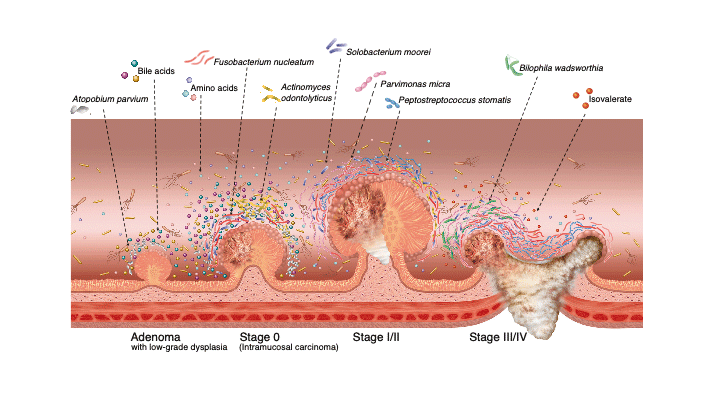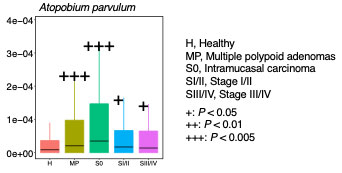News
Finding Gut Bacteria that Can Tell Onset of Colorectal Cancer - Hopes for Early Detection Updated in August 2019
A joint research team made up of Osaka University and others announced that it identified several types of gut bacteria which may trigger colorectal cancer. With the highest number of patients, colorectal cancer tops all other types of cancer in Japan. Results could be used for early detection and preemptive medical care to provide the necessary treatments before getting diagnosed as cancer. The research paper was published in Nature Medicine.
The research group consisted of:
Prof. Shinichi Yachida of Osaka University Graduate School of Medicine, Department of Cancer Genome Informatics; Prof. Takuji Yamada from Tokyo Institute of Technology School of Life Science and Technology; Prof. Tatsuhiro Shibata from University of Tokyo, Institute of Medical Science, Human Genome Center (Chief of Cancer Genomics Division at National Cancer Center Research Institute); and Specially Appointed Prof. Makoto Fukuda from Keiko University Institute of Advanced Life Science.
Next to gastric cancer, colorectal cancer is the most common cancer in Japan now. One reason is the westernized diet in Japan. Recent studies show that intestinal bacteria are deeply associated with various colonic diseases. According to the research team, the total number of cells in our body amount to about 37 trillion. The number of bacteria in the human intestine exceeds that number to reach 40 trillion. They can weigh about 1-1.5 kilograms.
Prof. Yachida and his colleagues surveyed 616 patients who visited the National Cancer Center Hospital and went through colonoscopy tests. In addition to feces analysis, surveys on patients’ diet and colonoscopy data were analyzed in detail.
As a result, they found that there were significant differences in the types of bacteria inside the intestine, according to each phase of cancer: from the onset to progressed cancer. Colorectal cancer progresses from a relatively early cancer (stage I-II) budding from intramucosal cancer found inside the mucous membrane and moves on to an advanced cancer (stage Ⅲ-IV). Some bacteria start to increase inside the mucous membrane from the onset and keep on increasing with the progression of cancer. Other types of bacteria were identified to increase upon the emergence of multiple polyps (glandular swelling or adenoma) which are not cancerous yet. There were also bacteria that increased in sync with intramucosal cancers.
Commonly known Bifidus or bifido-bacteria decreased upon the growth of intramucosal cancer. It was also found that some amino acids increased as cancer progressed. Moreover, there were correlations between the cancer stage and the type or amounts of metabolites (by-products from metabolic reactions) created by bacteria inside the intestine.
Based on these results, the research group devised a method to spot early stages of colorectal cancer like intramucosal cancer by examining the intestinal bacteria in patients’ stool. If these test methods could be included in routine medical checkups, it will allow early detection of colorectal cancer. Furthermore, the results could be used in preemptive treatment to prevent cancer by improving the environment inside our intestines.
Nature Medicine article:
https://www.nature.com/articles/s41591-019-0458-7









